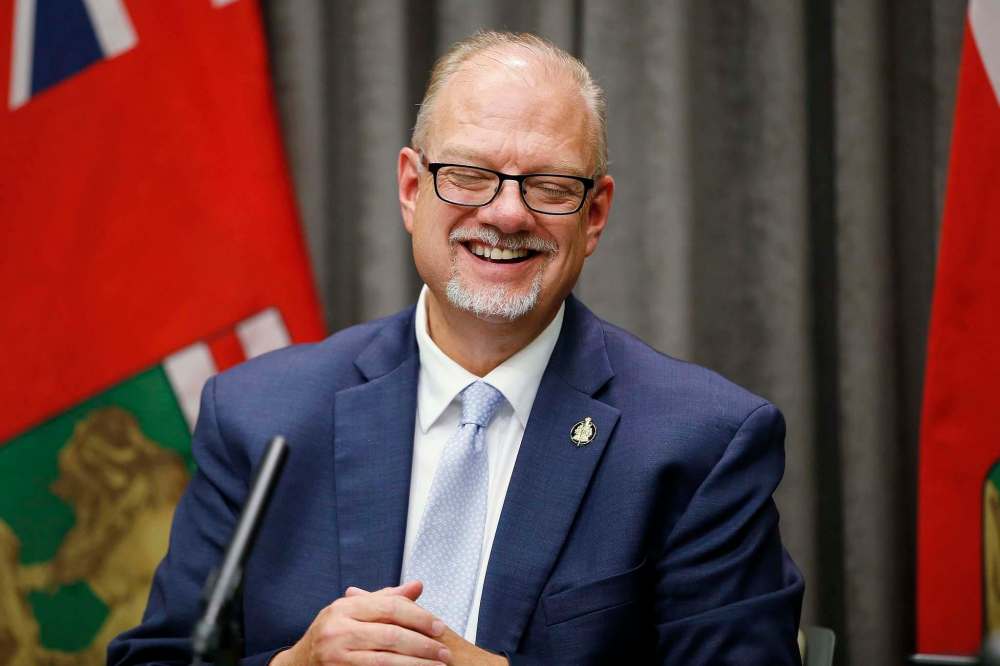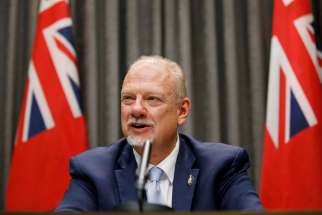New premier tired of the acrimony Goertzen drops controversial legislation, vows he'll 'be quick to listen and slow to speak' in temporary role before Progressive Conservatives choose new leader
Read this article for free:
or
Already have an account? Log in here »
To continue reading, please subscribe:
Monthly Digital Subscription
$0 for the first 4 weeks*
- Enjoy unlimited reading on winnipegfreepress.com
- Read the E-Edition, our digital replica newspaper
- Access News Break, our award-winning app
- Play interactive puzzles
*No charge for 4 weeks then price increases to the regular rate of $19.00 plus GST every four weeks. Offer available to new and qualified returning subscribers only. Cancel any time.
Monthly Digital Subscription
$4.75/week*
- Enjoy unlimited reading on winnipegfreepress.com
- Read the E-Edition, our digital replica newspaper
- Access News Break, our award-winning app
- Play interactive puzzles
*Billed as $19 plus GST every four weeks. Cancel any time.
To continue reading, please subscribe:
Add Free Press access to your Brandon Sun subscription for only an additional
$1 for the first 4 weeks*
*Your next subscription payment will increase by $1.00 and you will be charged $16.99 plus GST for four weeks. After four weeks, your payment will increase to $23.99 plus GST every four weeks.
Read unlimited articles for free today:
or
Already have an account? Log in here »
Hey there, time traveller!
This article was published 01/09/2021 (1560 days ago), so information in it may no longer be current.
Newly minted, temporary Manitoba Premier Kelvin Goertzen is striking a new tone, scrapping controversial legislation and pledging to listen to Manitobans.
“There is lots of division in Manitoba,” Goertzen said Wednesday, hours after being sworn in as premier.
“It’s the animosity that worries me, as much as anything.”
List of cancelled bills
Bill 64 — Among other reforms, it would have eliminated English-language school boards.
Bill 16 — Would have allowed an employer to fire an employee for “strike-related misconduct” (even if the employee has not been convicted of a criminal offence) and eliminated the right of striking workers to access binding arbitration after 60 days of strike action or lockout.
Bill 64 — Among other reforms, it would have eliminated English-language school boards.
Bill 16 — Would have allowed an employer to fire an employee for “strike-related misconduct” (even if the employee has not been convicted of a criminal offence) and eliminated the right of striking workers to access binding arbitration after 60 days of strike action or lockout.
Bill 35 — Would have had the Public Utilities Board approve rates in five-year intervals rather than annually, with the provincial cabinet setting rates in the meantime.
Bill 40 — Would have enabled liquor sales by third parties.
Bill 57 — Would have restricted the rights of protesters by allowing owners or operators of “critical infrastructure” (highways, pipelines, food-processing plants, hospitals and courthouses) to apply for a court order to halt or limit demonstrations.
— Carol Sanders
Goertzen will be premier for just two months, when the Progressive Conservative Party is set to elect its new leader, following Brian Pallister’s Wednesday resignation.
For the next few weeks, Goertzen plans to have many more visitors to his office than his predecessor, saying the premier must listen to Manitobans.
“I intend to be quick to listen and slow to speak; I want to hear what their views are,” he said, adding that social-media arguments over issues such as COVID-19 vaccines are driving Manitobans apart.
Goertzen announced that controversial education-reform Bill 64, as well as four other pieces of contentious legislation, will be taken off the order paper.
“Those bills will not move forward this fall,” he said, adding the government will either withdraw the bills or prorogue the legislature.
“A new leader has to be able to set their own agenda.”

However, the Progressive Conservatives intend to pass their budget-implementation bill when the legislature resumes in October, before the party chooses a new leader.
Lt.-Gov. Janice Filmon swore in Goertzen at a ceremony with no media access.
“I made the decision it should be just a small, private ceremony,” he said, explaining he didn’t want to make it seem like he had the full authority of a premier elected by popular vote.
He acknowledged that limiting the event to relatives had brought concerns about adequate media access, which he pledged to maintain.
“There’s a fair bit of bait and switch with this government.” – Liberal Leader Dougald Lamont
Goertzen said he’s reached out to NDP Leader Wab Kinew, Winnipeg Mayor Brian Bowman, the Assembly of Manitoba Chiefs and the Association of Manitoba Municipalities, all of whom Pallister had clashed with, or largely ignored in his five years as premier.
“We are political adversaries, but we are not political enemies,” Goertzen said of Kinew, the Opposition leader.
Kinew welcomed the change of tone, and said it was grassroots effort that led to Bill 64’s death. But he cautioned that Goertzen was the minister driving controversial health-care and education reforms.
Shortest stints as Manitoba premier
Kelvin Goertzen, set to serve less than two months as Manitoba premier, will likely have the second-shortest tenure in provincial history.

Less than a month: David H. Harrison was Manitoba’s sixth premier, from Dec. 26, 1887, to Jan. 19, 1888. He took over after John Norquay, leader of the officially non-partisan but effectively Conservative government, stepped down amid a controversy connected to railway development. Harrison resigned after losing two key byelections. The lieutenant-governor then asked opposition leader Thomas Greenway, who became the province’s first Liberal premier, to form government.
Kelvin Goertzen, set to serve less than two months as Manitoba premier, will likely have the second-shortest tenure in provincial history.

Less than a month: David H. Harrison was Manitoba’s sixth premier, from Dec. 26, 1887, to Jan. 19, 1888. He took over after John Norquay, leader of the officially non-partisan but effectively Conservative government, stepped down amid a controversy connected to railway development. Harrison resigned after losing two key byelections. The lieutenant-governor then asked opposition leader Thomas Greenway, who became the province’s first Liberal premier, to form government.

Three months: Marc-Amable Girard served for exactly three months: Dec. 14, 1871, to March 14, 1872. He is counted as Manitoba’s second premier but led its first ministry and could be considered the first premier. Girard, a Franco-Manitoban, resigned after losing the support of English cabinet ministers for his connection with Louis Riel, after Ambroise-Dydime Lépine was convicted of the murder of Thomas Scott during the Red River Resistance.

Less than a year: Hugh John Macdonald, the son of Canada’s first prime minister, was premier from Jan. 10 to Oct. 29, 1900. Shortly after winning the 1899 election, Manitoba’s eighth premier resigned to run for the federal Conservatives in Brandon and lost to incumbent federal Liberal cabinet minister Clifford Sifton.
— Adam Treusch
“The PCs are trying hard to rebrand themselves and project a new image, but… the new premier doesn’t quite turn the page,” said Kinew.
Liberal Leader Dougald Lamont similarly argued a new tone doesn’t guarantee substantive change.
“There’s a fair bit of bait and switch with this government,” Lamont said.
The opposition also raised the spectre of a Hydro rate hike, as a budget bill can change rates for a year, even without separate legislation to change the regulatory process.
Goertzen declined to sanction two government MLAs who publicly decried the Tories’ vaccination mandate for front-line workers as an infringement on Manitobans’ rights.
“MLAs should bring the views of their constituents vigorously to that table — and I think the best results happen when they come to that table,” he said.
He said his caucus might not have felt they had access to Pallister, and that he’d spoken directly with MLAs James Teitsma (Radisson) and Josh Guenter (Borderland).
“I don’t want, in my brief time as premier, to have everybody agree with me at the table; I don’t want to try to dominate a decision,” he said.
Yet both opposition parties said the pair should be punished, particularly Teitsma, who drew a comparison between the vaccine mandate and residential schools or the forced sterilization of Indigenous people.
“It’s such an emotional issue; we should only invoke residential schools when it’s absolutely necessary,” said Kinew.
“I don’t buy the argument that these folks are just standing up for their constituents.”
“I don’t want, in my brief time as premier, to have everybody agree with me at the table; I don’t want to try to dominate a decision.” – Premier Kelvin Goertzen
Guenter had argued it was wrong to change course on reopening, despite the rise of the substantially more contagious delta variant of COVID-19, while Teitsma puzzled virologists in claiming that mass outdoor gatherings of vaccinated people were less safe than unvaccinated people gathering in small indoor groups.
“Those two MLAs are repeating claims that are misinformation about vaccines; they’re undermining public-health orders, as we’re about to go into a fourth wave,” Lamont said, noting Manitobans are frustrated at some of the worst COVID-19 outcomes in Canada.
Kinew argued it was disingenuous of Goertzen to decry a rise in divisive rhetoric over vaccines when the party lacks “some courage” to discipline those two MLAs and persuade two others — Infrastructure Minister Ron Schuler and Seine River MLA Janice Morley-Lecomte — to get fully vaccinated.
Meanwhile, Goertzen has appointed Families Minister Rochelle Squires as deputy premier, and says he does not anticipate any other changes to cabinet while it’s in caretaker mode.
The PCs still plan to eventually reform the public-school system, and Goertzen said Education Minister Cliff Cullen will discuss Bill 64 at a Thursday press conference.
dylan.robertson@freepress.mb.ca
History
Updated on Wednesday, September 1, 2021 7:32 PM CDT: Adds second factbox
Updated on Wednesday, September 1, 2021 11:01 PM CDT: Makes minor change to sidebar in box.











